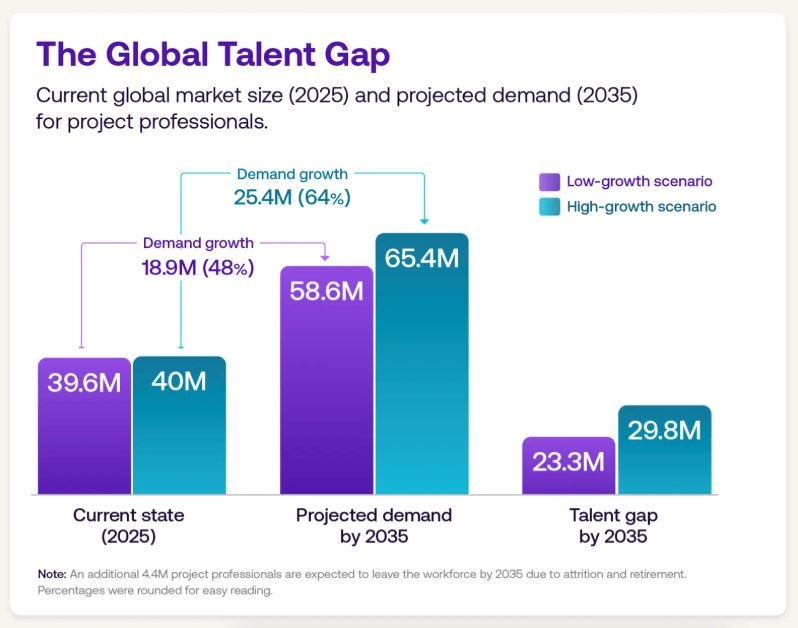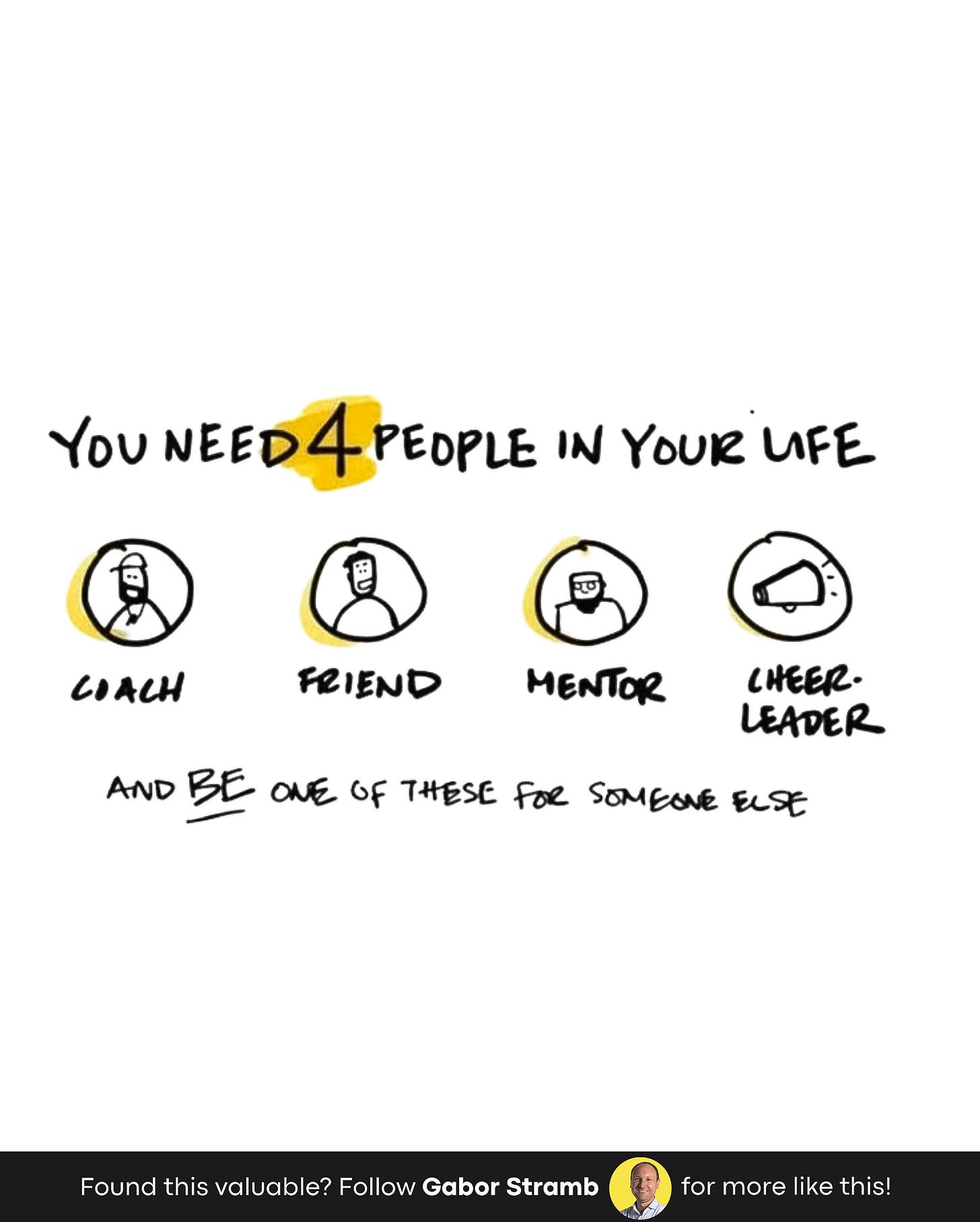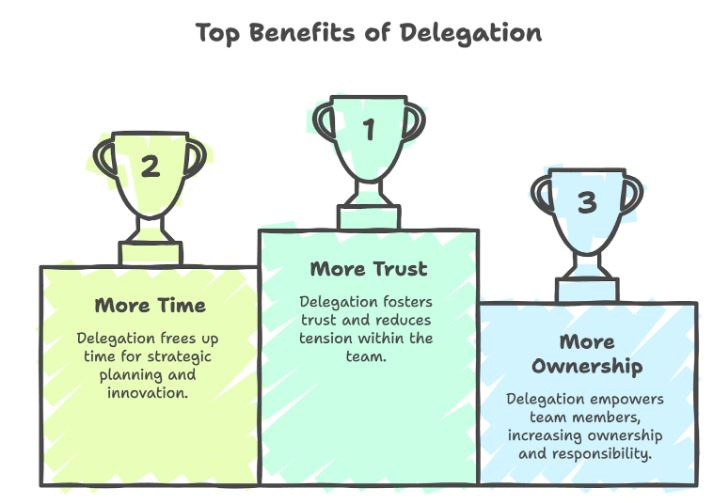Delegating as PM: What I Had to Unlearn
PM = Coach, Friend, Mentor, Cheerleader
Welcome to the Agile Admiral weekly newsletter. Your Essential Resource for Project Management Excellence.
Each week, I tackle reader questions about PMP preparation, how to implement PMP into real-life projects, and a Senior Project Manager career.
For more: Project vs. Change Management | The Chaos Coordinator | The Project Habit You’re Probably Skipping | When Projects turn RED | Macro vs Micro Goals for PMs | PM without authority is just a punching bag with a calendar |
What's Inside This Edition:
PM = Coach, Friend, Mentor, Cheerleader
What’s new from PMI? - Global Project Management Talent Gap
Delegating as a PM: What I Had to Unlearn
The world may need up to 30M more Project Managers
PMI forecasts a possible global talent gap of up to 30 million project professionals by 2035. Explore the data behind the demand and what’s at stake if we don’t close the gap.
Source: PMI
You need 4 people in your life as a Project Manager.
And if you're lucky, you'll also be one of these for someone else.
👇 Here's the perfect mix:
1️⃣ A Coach – who challenges your thinking, sharpens your decision-making, and pushes you out of your comfort zone. They don’t let you settle for “good enough.”
2️⃣ A Friend – who gets it. Who listens when the project feels like it’s falling apart? Who reminds you to breathe when the scope creeps and the deadlines tighten?
3️⃣ A Mentor – who’s been there, done that, and has the war stories to prove it. They help you zoom out, see the bigger picture, and remind you it’s all part of the journey.
4️⃣ A Cheerleader – who celebrates every win with you. Yes, even the small ones like surviving that brutal stakeholder meeting or getting that risk register in on time.
Being a PM isn’t just about tasks and timelines. It’s about people, including the ones behind the scenes, who make you better, stronger, and more human.
🟡 So, who are your 4?
And whose 4 are you?
Delegating as a PM: What I Had to Unlearn
There was a time when I thought being a “good” Product Manager meant being everywhere.
In every doc. Every call. Every detail.
I believed my value came from holding it all together.
I didn’t call it control.
I called it care.
But the truth? I was spreading myself thin — and bottlenecking the team in the process.
Until one day in retro, a teammate said —
“You’re great at keeping things moving. But sometimes it feels like you carry too much alone.”
That sentence landed hard.
Because they were right.
I was trying to do it all — and in the process, I was keeping the team from growing.
That moment forced me to pause and reflect. It was the wake-up call I didn’t know I needed.
So I did what PMs do best: I started mapping the problem. And that’s when I realized… I had a delegation problem.
What PMs Can Actually Delegate
At first, it felt like everything was too important to hand off. But slowly, I started noticing patterns — and possibilities.
Turns out, delegation isn’t about dumping work. It’s about distributing ownership in a way that strengthens the whole team. Here’s what I learned I could delegate (and still do today):
Task ownership
Instead of handing out tickets, I began inviting team members to define solutions. That created real ownership — not just completion. This shift made work more meaningful for them — and more scalable for me. It also led to stronger ideas than I could’ve come up with alone.
Meeting roles
I used to run every call. Now, I rotate note-takers, ask engineers to walk through demos, and let designers lead critique. It builds confidence and shared rhythm.
This didn’t just take work off my plate — it built team presence and participation. Meetings became more collaborative, and people showed up with more energy.
Project follow-ups
Chasing updates was draining. Sharing async responsibility made us faster — and less reliant on me. I created simple templates and rhythms for updates so anyone could jump in. Now, status never lives in just one person’s head.
Internal documentation
I stopped rewriting everyone’s thoughts. Instead, I ask them to share what they see. Their voices are often clearer anyway. Our docs became more reflective of diverse perspectives, not just mine. And teammates started owning their narratives more.
How I Started Letting Go (Without Losing Grip)
Delegation didn’t feel natural at first.
But I built a system that made it easier: Because without structure, I found myself slipping back into old habits.
Here’s what helped me shift:
I started with the why
I used to assign tasks. Now, I give context: what we’re solving, who it’s for, and why it matters. People do their best work when they understand the mission. It turns execution into ownership — and questions into creativity.I defined outcomes — not instructions
I don’t hand out checklists. I describe the destination, then let them choose the road. That freedom unlocks creativity and better solutions. Plus, it helps the team grow their judgment, not just their skills.I aligned on check-ins
Micromanaging is tempting — especially under pressure. But I now co-create the check-in rhythm with the team. It keeps us aligned without hovering. Everyone knows when we’ll sync — so they don’t feel watched, just supported.I made space for mistakes
Delegation only works if failure isn’t punished. I learned to hold space for “oops” moments — and turn them into “next time” lessons. Those mistakes? They’ve often led to some of our best learnings.
What Changed When I Delegated
Letting go didn’t just free up my calendar — it transformed how the team operated.
Here’s what actually got better when I stopped trying to do it all myself:
More trust. Less tension.
Instead of being the hub, I became the enabler. People leaned into their roles with more clarity — and more confidence. And I could finally stop spinning all the plates.More time for strategy.
With less on my plate, I could finally zoom out and think big. I had room to shape the vision, not just chase the to-dos. That shift changed the quality of everything — from planning to execution.More team ownership.
I wasn’t the only one caring anymore. Everyone started owning — and even anticipating — what needed to happen. And the best part? They started challenging and elevating each other, too.
But Let’s Be Real: Delegation Isn’t Always Easy
I’ve struggled. I still do sometimes.
Letting go means confronting a lot of invisible fears. Here are a few that lingered — and what helped me push through:
“What if it’s not done how I’d do it?”
It won’t be. But that’s how people grow — and surprise you. Different doesn’t mean worse. It often means better in ways you didn’t expect.
“I don’t want to be a burden.”
True delegation isn’t dumping — it’s inviting someone to step up. It signals trust, not offloading. People usually rise to the occasion.
“It’s faster if I do it myself.”
In the short term, maybe. In the long run? It burns you out and bottlenecks the team. Speed today can cost you scale tomorrow.
“What if it fails?”
Then we learn together. And we try again, better. Failure’s not the end — it’s part of the iteration.
A Moment That Stays With Me
On a recent project, I asked a junior dev to lead the demo for our client.
She was nervous — but I gave her the space, support, and trust. I told her I’d be there if she needed me, but that it was hers to lead.
Afterwards, she said:
“I didn’t think I could do that. But now I want to do it again.” That’s what delegation is really about. Not just moving work around — but moving people forward.
As PMs, we think we need to hold it all.
But the best product work doesn’t happen when one person does everything. It happens when everyone does what they’re best at — together.
If you’re a PM learning to let go, you’re not alone.
Start small. Share context. Invite ownership. And if this resonated — pass it on to someone else navigating the same shift.
Let’s build teams that grow because we do.
Thank you for reading. Appreciate you!
Let’s win together,
If you’re interested in any of the products or services I offer, here’s a quick recap:
👉🏼Do it together - join the PMP Operation System
👉🏼Do it 1-on-1 - join 8-week coaching program
https://gaborstramb.com/special-offer









